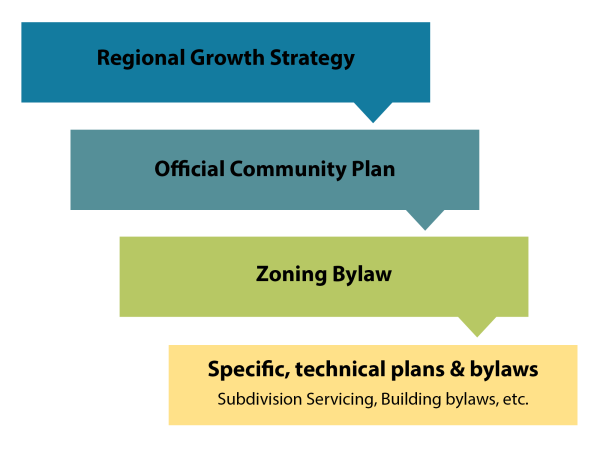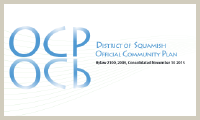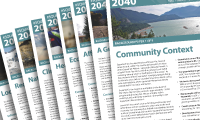Frequently Asked Questions
What is an Official Community Plan? Why do we need one? How can I get involved? Learn more about our Official Community Plan (OCP) below.
Official Community Plan (OCP)
-
What is an Official Community Plan (OCP)?
The Official Community Plan (OCP) is our community’s highest level, overall plan for the future. It sets out a clear vision for how Squamish will grow and develop over the next 20 years. The OCP guides future land use decisions, infrastructure and community service investments, and conservation of the natural environment, among other topics.
The OCP will guide future planning decisions like:
- Where should new development go and what form will it take?
- How can we create more local jobs in growth sectors that are relevant for the future and our demographic shift?
- How can we conserve natural areas as growth and development occur?
- How can we create a built environment (roads, parks, trails, gathering areas) that meets the community’s aspirations and values in our neighbourhoods?
- What types of housing do existing and future residents need, and how can we encourage more affordable housing?
- How can we support nature-based tourism while protecting environmental values?
- How can we create a healthy and active community that is safe, convenient, and accessible for people of all ages and abilities?
-
Why do we need a new plan?
There has been a significant shift in reality since the last OCP was adopted in 2010. Squamish is growing, quickly. According to the latest census, Squamish is one of the fastest growing communities in the province. Development trends in Squamish have shifted significantly since 2010 and this has resulted in opportunities and challenges not clearly foreseen at the time of developing the current OCP. In addition to growth, Squamish has seen a major swing in demographics; climate change and the environment are of increasing concern; we're faced with changing economic realities; and our society is becomingly increasingly digitized. By setting out a clear community vision today, we can shape our future growth in a way that is sustainable and provides a high quality of life for current and future residents.
OCPs are typically updated every 10 years or so as communities change. This OCP update will check that the current OCP policies are still relevant and will add in new policies to reflect community-identified issues and concerns, trends and emerging best practices that have been learned since the last OCP was written.
The new OCP will also reassess growth projections and integrate recent plans and studies, such as the Downtown Neighbourhood Plan, Employment Lands Strategy, Estuary Management Plan, transportation plans, affordable housing, flood mitigation strategies, and planning for climate change, among others. In this way, we're trying to incorporate the good work of the last few years into our overall plan.
-
How do other plans relate to the OCP?
The OCP is influenced by the Squamish-Lillooet Regional Growth Strategy, which sets the overall vision for the livability of the region and prioritizes goals across the region to meet common social, economic and environmental objectives.
In the District, the OCP is the highest-level strategic plan, and other District plans, strategies, and policies must support the vision and policies in the OCP. The following diagram shows the relationship of these plans.

-
What is the process and how do I get involved?
Over the next year we are asking residents, business owners and community stakeholder groups to share what they value most about Squamish and to weigh in on how the District can build on our strengths while planning for the future. There will be many opportunities for you to learn more, attend an event and provide feedback throughout the process.
- In Phase 1, our process begins with a fun and interactive Visioning Event and questionnaire. Join us as we explore early ideas for Squamish’s future.
- In Phase 2, we will dive deeper into specific topics and discuss key options and trade-offs. Take part in citizen-led “OCPizza Night” discussions or attend the Public Open House.
- In Phase 3, we will use the feedback received to date to develop a full draft of the updated OCP and ask for your comments on the plan to make sure we are on the right track.
- Finally, in Phase 4, we will finalize the plan and present it to Council for approval.
District staff will lead the development of the new plan with engagement support from a team led by Modus Planning, Design & Engagement Inc.
The project is also being guided by a Citizen Advisory Committee, who is responsible for providing insight from local residents on the engagement process, ensuring that any policy development reflects what we heard from the public, being a sounding board for the engagement process (including selection of consultants), and helping to share information and raise awareness through their networks.
-
Who is on the Citizen Advisory Committee?
The Citizen Advisory Committee consists of the Mayor, one Councillor and up to 10 community members (listed in alphabetical order below).
- Lisa Ames
- Bill Cavanagh
- Karen Elliott, Councillor
- Gary Fitzpatrick
- John Hawkings
- Patrica Heintzman, Mayor
- Murray Journeay
- Grant McRadu
- Darcy McNeil
- Sally Rudd
- Toran Savjord
The Citizen Advisory Committee is responsible for providing insight from local residents on the engagement process, ensuring that any policy development reflects what we heard from the public, being a sounding board for the engagement process (including selection of consultants), and helping to share information and raise awareness through their networks. View the Committee's Terms of Reference.
Community members submitted applications to sit on the committee and were selected by the District’s Chief Administrative Officer to assist staff and Council establish a broad cross-section of opinion and experience.
Advisory Committee meetings will be open to the public and will be advertised once a more regular meeting schedule is established.
-
How is the Squamish First Nation involved in this process?
The Squamish First Nation has been formally invited to participate in the process and to sit on the Advisory Committee. The Nation declined to participate on the committee in favour of a more formal consultation through Council-to-Council meetings.
-
Who can I contact for more information?
Gary Buxton, General Manager of Development Services and Public Works
- Phone: 604.815.6870
- Email: gbuxton@squamish.ca
Jonas Velaniskis, Director of Development Services
- Phone: 604.815.5017
- Email: jvelaniskis@squamish.ca
-
When do I submit the workbook and receipts?
The deadline for workbook submissions is May 13, 2016. Your receipts can be submitted along with the workbook.



